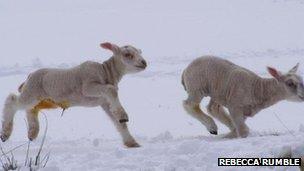Spring snow: Thousands of animals feared dead
- Published

Farmers fear that thousands of sheep and cattle have died in the snow that has hit in recent days.
Northern Ireland farmer Catherine Crawford said: "There are hundreds of farmers who have sheep buried."
"We are very, very, anxious," said Carolyn Lamb from NFU Scotland, who added that the full toll would not be known until the snow melted.
The NFU said hundreds of animals were lost in England and Wales, with Cumbria and Shropshire worst hit.
"There are animals going to die here and are dying; we need help out in the rural areas," said Ms Crawford.
The late snow has hit during lambing season, "a key time for farmers", making the situation worse, the NFU said.
Campbell Tweed, a farmer from Cairncastle near Larne in County Antrim, said some of his sheep were getting their first feed in four days.
"Road conditions are just incredibly bad. There's places where the snow at the side of the road is higher than the vehicles. It's coming late in a very, very tough winter - it's just putting the tin hat on it for many of us."
Southern Scotland has been worst affected. "This is really becoming an animal welfare issue," Ms Lamb said, as many animals are stuck, with no way of getting food to them.
There were also fears of "catastrophic losses," with thousands of animals buried, on the Isle of Man. According to the Isle of Man meteorological office, the island's recent snowfall was the heaviest recorded since 1963.
In Scotland, about 3,300 customers in Kintyre, Argyll and the Isle of Arran were waiting to be reconnected to electricity. But all properties in Wigtownshire (Dumfries and Galloway) have now been connected.
In Northern Ireland, only 50 properties in Kilcoo and Leitrim, County Down, and Ballyvoy area of Ballycastle remained without supply.
A Met Office "yellow warning" urging people to be aware of the risk of ice and snow remains in force for Scotland, Northern Ireland, north-east England and the Yorkshire-Humber region.
Although road routes on the south of Arran had opened up, the BBC's Colin Blane, at Blackwaterfoot, said: "It's very difficult to get over to the west side. We came through a road that really was like a canyon, the snow 8-10 feet high and room only for only one vehicle.
Derbyshire County Council has said snow that has hit parts of the county are the worst the area has experienced for 50 years.
In Cumbria, electricity supplies have now been restored to all areas, and many roads have reopened after the weekend's severe weather.
However, road access to the hamlet of Hall Waberthwaite, near Millom, were still blocked by drifts on Monday and one resident said their situation was "dire", with food in the 10 properties starting to run out.
In its forecast, the Met Office issued an extension to its previous amber alert for "severe weather action".
It said there was a 100% probability of severe cold weather and icy conditions between 08:00 GMT on Monday and 08:00 GMT on Friday in parts of England.
"Bitterly cold easterly winds will persist this week, bringing snow showers to north-east England and light snow flurries across other areas of England.
"With lying snow and partial snow melt during the daytimes, icy conditions are likely during the nights," it said.
- Published25 March 2013
- Published25 March 2013
- Published25 March 2013
- Published25 March 2013
- Published25 March 2013
- Published25 March 2013